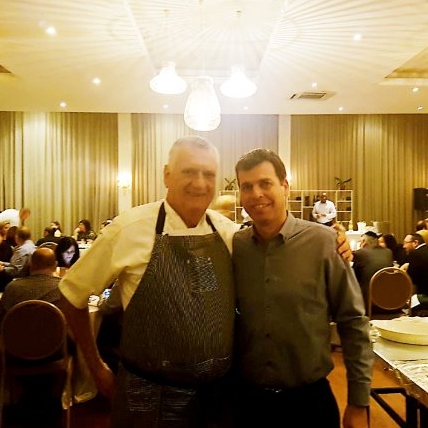
News

Showing Israel as a culinary destination
JORDAN MOSHE
“When people are exposed to Israel, they usually see one of two things: negative news coverage about something bad Israel has been accused of doing, or the typical features of Israeli culture,” explains Yossi Elad, a gourmet chef and proud Sabra.
“I have a chance to show people a little of the true Israel, what we do besides fighting and falafel. I can let them experience Middle Eastern cuisine in a way they never have before.”
Here at the invitation of his close friend, Israeli ambassador Lior Keinan, Elad – together with Chemdat Goldberg and Ori Eliat – was part of a trio of Israeli chefs who served up an Israeli feast at the HOD Hall in Orchards this past Monday.
The Israeli embassy hosted ‘A Taste of Israel’ event in celebration of Israel’s 70th birthday. Keinan contacted Elad and arranged the dinner months ago.
“People ask me how I define Israeli cuisine,” says Elad. “I always say that we take the diverse culinary tapestry that the Middle East has to offer, and we give it our unique interpretation. Mostly, this means giving the dishes one essential ingredient: chutzpah.”
With restaurants in Jerusalem and London, and soon in Frankfurt, Yossi Elad has emerged as a key figure in Israel’s recent gastronomic revolution.
Israel is the ideal place from which culinary innovation can emerge, Elad explains. “We are a Kibbutz Galuyot, an ingathering of exiles from different places all around the world,” he says. “We inherit different food traditions from our parents and give them new life by mixing them with other traditions and creating something different.”
Elad believes that the food can illustrate what Israeli values really are. “For an Israeli, a meal is not only about the food, but about the company. “When we sit around a table together, strangers can feel like a family. We share something special together.”
What Elad aims to achieve by hosting events such as this one is to show the world that Israeli cooking can be taken just as seriously as French or Italian. “I want people to know that Israelis can cook,” he laughs. “Jews in South Africa are very proud of Israel, and this event can give them another reason to feel proud of it. The reality is that people around the world are eager to embrace Israeli food. There are Israeli restaurants in Paris that are always full, and one must book two months in advance for a table.”
Together with the staff of Gary Friedman Caterers, the Israeli trio served up a three-course meal consisting of signature Middle Eastern dishes. Starting with moussaka – a cooked salad dish of aubergine and fish, served with spicy tahini and green salad on lafa – most diners’ palates were initially uncertain of the foreign piquant flavour.
More recognisable were the salads that followed, which included a fried bulgur and onion salad, chickpea and pomegranate salad, and Israeli arisa.
These were accompanied by a maklouba. A traditional Arab dish, it includes meat, rice and fried vegetables placed in a pot, which is then flipped upside down when served, hence the name, which translates as “upside down”.
As the dinner progressed, Elad ambled through the dining room assessing the reaction to his creations.
“I’m never insulted if people tell me they don’t enjoy a dish,” he admits. “I do what I can in preparing a dish, but the rest is up to those who eat it.”
Reactions to his dishes varied. For many, some of the tastes were too harsh or acerbic. Others welcomed the flavours and returned to Elad for seconds
The evening concluded with malabi for dessert, a coconut milk-based pudding topped with grenadine, rosewater and pistachio.
Having been on his feet for over 16 hours preparing the meal, Elad seemed pleased with the overall success of the evening. Despite the fact that he turns 70 on his next birthday, he remains enthusiastic about what he does, and looks forward to his upcoming stops in Frankfurt, France, London and Singapore.
Expressing his hope that South Africans’ interest in Israeli food proves to be no mere passing trend, Elad looks forward to seeing signature Israeli dishes be a part of what he calls the “culinary universe”, alongside Italian, Greek and others. “Everyone can take something out of the kitchen,” he explains. “Cooking is about art, not just making food. It’s part of us and our identities, and that’s something we should always cherish.”




